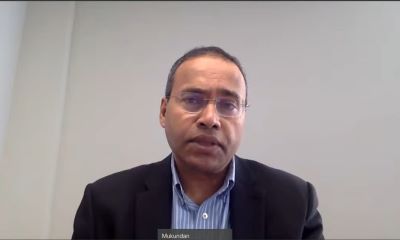Many industries in India don't have time beyond 2050 as they are connected to the international capital system and have global value chains

This shift towards net zero emissions is on us and many of us sitting in the industry can't ignore it as the pressure point is not just coming from regulations but the capital markets, says Ramakrishnan Mukundan, Chief Executive Officer, Tata Chemicals Ltd. (TCL) while speaking at CII Manufacturing Conclave.
"It will be difficult to raise funds in the long run for both listed and unlisted companies. While that is external, internally to employees and customers will seek the shift. This must be viewed as a key element to build an organization that stakeholders trust. And that starts with having a sense of purpose and building culture and values. For long-term survival, companies will have to reduce the say-do gap between saying and doing," Mukundan opines.
Tata Chemicals is actively working towards achieving a net zero target. About one third of TCL’s decarbonization will come from energy savings. “One third comes from biomass, one third from switching to hydrogen, and the rest from carbon capture. We are the first to build the first industrial-scale Carbon Capture & Utilization demonstration plant in the United Kingdom. It will reduce carbon emissions while ensuring a secure, sustainable supply of carbon dioxide. While a good amount of work has been done, a lot remains to be done on the supply chain side,” Mukundan informs.
He said that the industry needs to set the target and has to pack it with capital and projects by 2030 as it is near term. “We hardly have eight years left to execute and even out of that we have only six years as you look at the outcome in the 7th year, two years before the target to put the capital to work. And in case we are looking at the 2050 target, we actually have a 15-year window before we deliver net zero. We have to work on both the demand side as well as supply side. On the demand side, we have energy efficient programmes. Government has good policies such as LED and thrust on green mobility and adoption of electric vehicles by various states, star ratings have really taken off pushing people towards more energy efficient usage. Valuation multiplies as we have seen in case of new listing of the companies,” Mukundan adds.
In the Indian context, there is ambition and we have set a target for net zero. While the government has put a market of 2070 and that is fine but in my view, many industries in India don't have time beyond 2050 as they are connected to the international capital system and have global value chains. Since the other counterparts globally are moving fast, it is upon the industry to have joint effort and achieve it by 2050. There can't be one single approach and there has to be a sectoral approach," he comments.
On the policy and regulatory front, Mukundan says, “Policy in terms of PLI for solar and green hydrogen has been announced. Ingredients for plan and pathway are there. At industry level, we need to have a reporting system. The Government, Ministry of Corporate Affairs and DSIR have already started but all of us need to voluntarily go for it. We should be transparent with the stakeholders. In terms of capability building which is critical, large companies are already doing it but the need of the hour is to push the SMEs in line with it.”
Mukundan points out the need for financing options and alignment with access to technology as big players are moving fast globally.
“We need to focus on removing roadblocks. We must fix our broken distribution system including reforming the state electricity boards. The ambition won't hold if our policies aren't clear. Just like wind and solar, we need to have energy source based policies clear. For example biomass policy needs to be defined and similarly we can't ignore nuclear power. On the demand side, we have to tick all the boxes of low hanging fruits before going to big tickets such as lithium batteries. All in all we have a lot of opportunities,” he opines.
On the way forward, Mukundan says, "The message is that technology and innovation is the key. Think end to end as a circulatory approach helps the multiple lives of the same product. Collaborate for solutions beyond boundaries, not just your organization. And take a longer view like a marathon runner as this is not a sprint. It is a test match and you need to pace yourself accordingly. One should not get immobilized by short term targets and we must keep moving.”
Subscribe to our newsletter & stay updated.